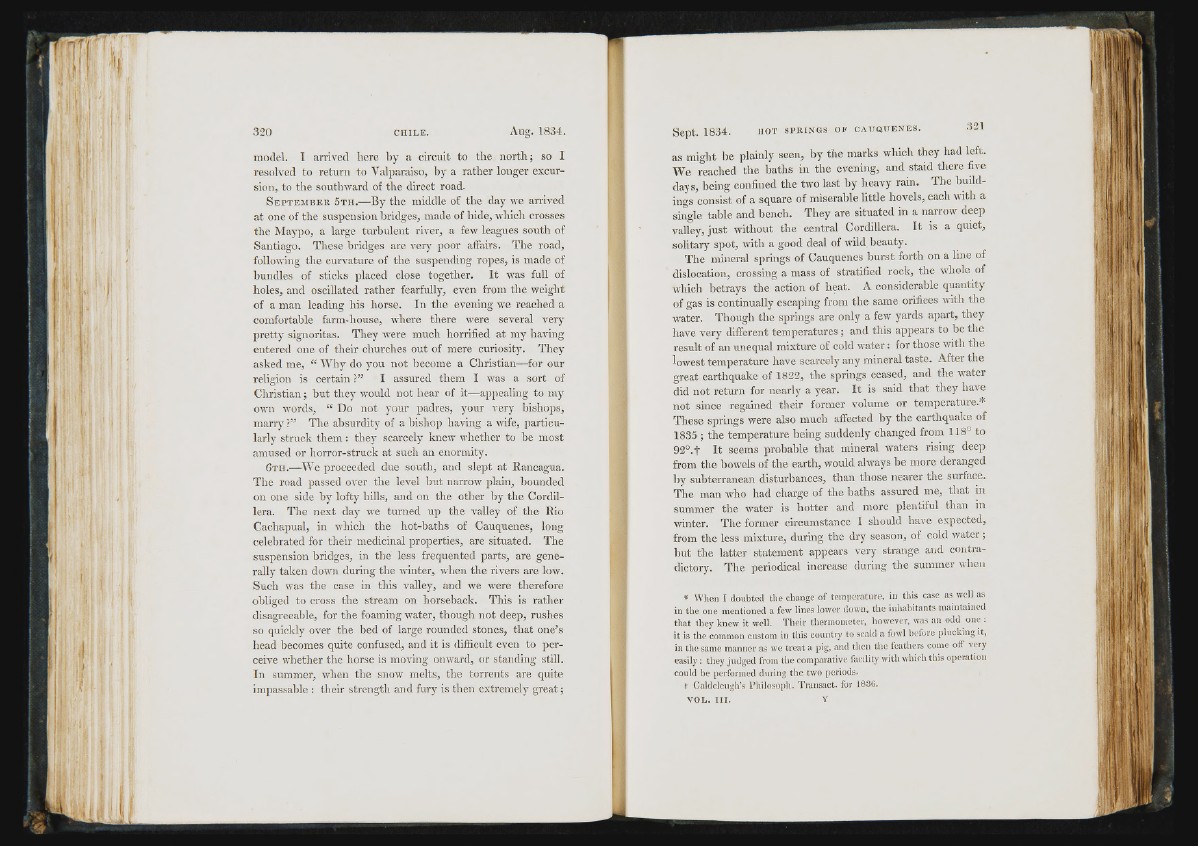
r
■ti
Í model. I arrived here by a circuit to the north; so I
resolved to return to A’alparaiso, by a rather longer excursion,
to the southward of the direct road.
S ei’Tember 5tii.—By the middle of the day we arrived
at one of the suspension bridges, made of hide, which crosses
the Maypo, a large turbulent river, a few leagues south of
Santiago. Tliese bridges are very poor affairs. The road,
following the curvature of the suspending ropes, is made of
bundles of sticks placed close together. It was full of
holes, and oscillated rather fearfully, even from the weight
of a man leading his horse. In the evening we reached a
comfortable farm-house, where there were several very
pretty signoritas. They were much horrified at my having
entered one of their churches out of mere curiosity. They
asked me, “ M’hy do you not become a Christian—for our
religion is certain ?” I assured them I was a sort of
Christian ; but they would not hear of it—appealing to my
own words, “ Do not your padres, your very bishops,
marry ?” The absurdity of a bishop having a wife, particularly
struck them : they scarcely knew whether to be most
amused or horror-struck at such an enormity.
6 t i i .—AA’e proceeded due south, and slept at Rancagua.
The road passed over the level but narrow plain, hounded
on one side by lofty hills, and on the otlier by the Cordillera.
The next day we turned up the valley of the Rio
Cachapual, in which the hot-baths of Cauquenes, long-
celebrated for their medicinal properties, are situated. The
suspension bridges, in the less frequented parts, are generally
taken down during the winter, when the rivers are low.
Such was the case in this valley, and we were therefore
obliged to cross the stream on horseback. This is rather
disagreeable, for the foaming water, though not deep, rushes
so quickly over the bed of large rounded stones, that one’s
head becomes quite confused, and it is difficult even to perceive
whether the horse is moving onward, or standing still.
In summer, when the snow melts, the torrents are quite
impassable ; their strength and fury is tlicn extremely great;
as might be plainly seen, by the marks which they had left.
We reached the baths in the evening, and staid there five
days, being confined the two last by heavy rain. The buildings
consist of a square of miserable little hovels, each with a
single table and bench. They are situated in a narrow deep
valley, just without the central Cordillera. It is a quiet,
solitary spot, with a good deal of wild beauty.
The mineral springs of Cauquenes burst forth on a line of
dislocation, crossing a mass of stratified rock, the whole of
which betrays the action of heat. A considerable quantity
of gas is continually escaping from the same orifices with the
water. Though the springs are only a few yards apart, they
have very different temperatures; and this appears to be the
result of an unequal mixture of cold water: for those with the
lowest temperature have scarcely any mineral taste. After the
great earthquake of 1822, the springs ceased, and the water
did not return for nearly a year. It is said that they have
not since regained their former volume or temperature.'*
These springs were also much affected by the earthquake of
1835 ; the temperature being suddenly changed from 118° to
92°.t It seems probable that mineral waters rising deep
from the bowels of the earth, would always be more deranged
hy subterranean disturbances, than those nearer the surface.
The man who had charge of the baths assured me, that in
summer the water is hotter and more plentiful than in
winter. The former circumstance I should have expected,
from the less mixture, during the dry season, of cold water;
but the latter statement appears very strange and contradictory.
The periodical increase during the summer wlien
* W h e n I d o u b te d th e c h an g e o f tem p e ra tu re , in th is case as w e ll as
in th e o n e m e n tio n e d a few lin e s low e r d ow n , th e in h a b ita n ts m a in ta in e d
t h a t th ey k n ew i t w e ll. T h e ir th e rm om e te r , Itow ev cr, was a n o d d o n e ;
i t is th e c om m o n c u s tom in th is c o u n try to sc ald a fowl b e fo re p lu c k in g it,
in th e s am e m a n n e r as we t r e a t a pig, a n d tlicn tlie f e a th e rs com e o ff v e ry
e a s ily : th ey ju d g e d from th e c om p a ra tiv e fac ility w ith w liid t tliis o p e ra tio n
c o u ld b e p e rfo rm e d d u r in g tlie tw o p e rio d s .
t C a ld c lcu g ii’s P lh lo so p li. T r a n s a c t, for 1836.
VOL. I I I . Y
' !